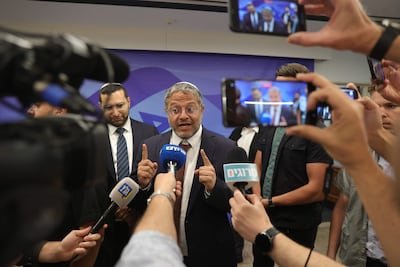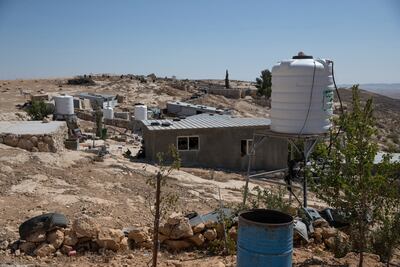A prominent civil society leader has called Prime Minister Benjamin Netanyahu's meeting with politicians of Israel's biggest Arab political party on Monday a "breakthrough", as the government tries to tackle a drastic surge in crime rates within the Palestinian-Israeli community.
Dr Thabet Abu Rass told The National the crime wave was so acute that "this is not just a police matter, but a deeper one that must be directed by the Prime Minister".
But he added that "we still need to see if [Mr Netanyahu] accepts the recommendations that Arab lawmakers gave, especially the formation of a ministerial committee dedicated to the issue".
Mr Netanyahu's office on Monday said both parties had agreed to form such a committee to "eradicate the criminal scourge".
The meeting took place after the 91st murder of a Palestinian resident of Israel so far this year, a rate almost triple the total of 34 murders throughout last year.
Khaled Khaldi, 50, was killed in the Bedouin hamlet of Khawalad.
Leader of coalition Hadash-Ta'al Ayman Odeh said his politicians "do not hang our hopes on talk, the test will be results".
Dr Abu Rass said he regrets "not all Arab members of the Knesset attended" the talks but he understood their decision given the continuing "great mistrust that needs to be dealt with".
The meeting came on the same day of Israel's far-right National Security Minister Itamar Ben-Gvir's announcement that a policy co-ordinator would be appointed to reduce crime rates in the community.
There is widespread Palestinian-Israeli distrust of Israel's police and new government, the most right-wing in the country's history.
In April, police commissioner Kobi Shabtai said in a leaked phone call it was in the "nature" of Arabs to kill each other.
Palestinian-Israeli politician Hana Swaid last month told The National the government's budget was "irrelevant" to his community's needs.
"We didn’t see any money allocated for fighting violence in the Arab society, which is becoming the most urgent and acute problem in the community," he said.

Mr Abu Rass said Mr Ben-Gvir was "not happy with the Prime Minister’s initiative, because combating crime falls under his responsibility".
"But we’ve seen since the formation of the government Mr Ben-Gvir doesn’t care about the issue. We don’t trust him. He’s racist," he added.
Critics of Mr Ben-Gvir highlight the far-right politician's long history of anti-Arab rhetoric. He has previously called for occupied Palestinian territories to be annexed and for the deportation of "disloyal" Arabs.
A key criticism of Mr Ben-Gvir's approach to security is his plan to form a controversial national guard, which some experts fear would divert resources from police.
Mr Ben-Gvir reiterated his commitment to the policy on Monday, promising to allocate "enormous" resources to police at the same time.
Israeli security experts are divided on the proposals, which Mr Ben-Gvir listed as a key manifesto pledge.

Prof Gabi Siboni in April told The National Israel was “late in creating” such a force, which would be crucial during “conflicts with Israel’s enemies, in which the country could face extreme internal conditions”.
But Merav Lapidot, formerly chief spokeswoman of Israel’s police, told The National a national guard would divert funds from an overstretched police force that "currently lacks 2,000 officers and needs more money, not a new national guard with expensive new headquarters”.
“We can assume Mr Ben-Gvir wants a private militia so he can address whatever he wants, whenever he wants,” she added.
Crime leaders filling power vacuum
Organised crime is thought to be a major factor in the surge in murder rates this year.
Mr Abu Rass last month said the recent trend of established criminals fleeing abroad had left a power vacuum that "has led to territorial disputes among second-tier crime leaders, who are trying to establish themselves as heads of these groups".
He also said crime was thriving as a result of a lack of investment and poverty in Arab-majority areas of Israel.
"Some Bedouin towns do not have banks, so they look to organised crime groups for loans," he said.
"I come from a Palestinian town in Israel. It has a population of 27,000. We don’t even have a police station there."
Domestic violence is also thought to be a key driver for this year's rising murder rate.
At the beginning of the month, a 26-year-old woman and her two children were found dead in their home. The husband was arrested on suspicion of murder.
For Mr Abu Rass, addressing the murder rate is crucial for the entire country.
"This killing will reach Jewish people and Jewish towns," he said. "These issues do not have borders. There is a lot of mobility between Jews and Arabs. So it’s about time for Israel to combat crime and violence."


